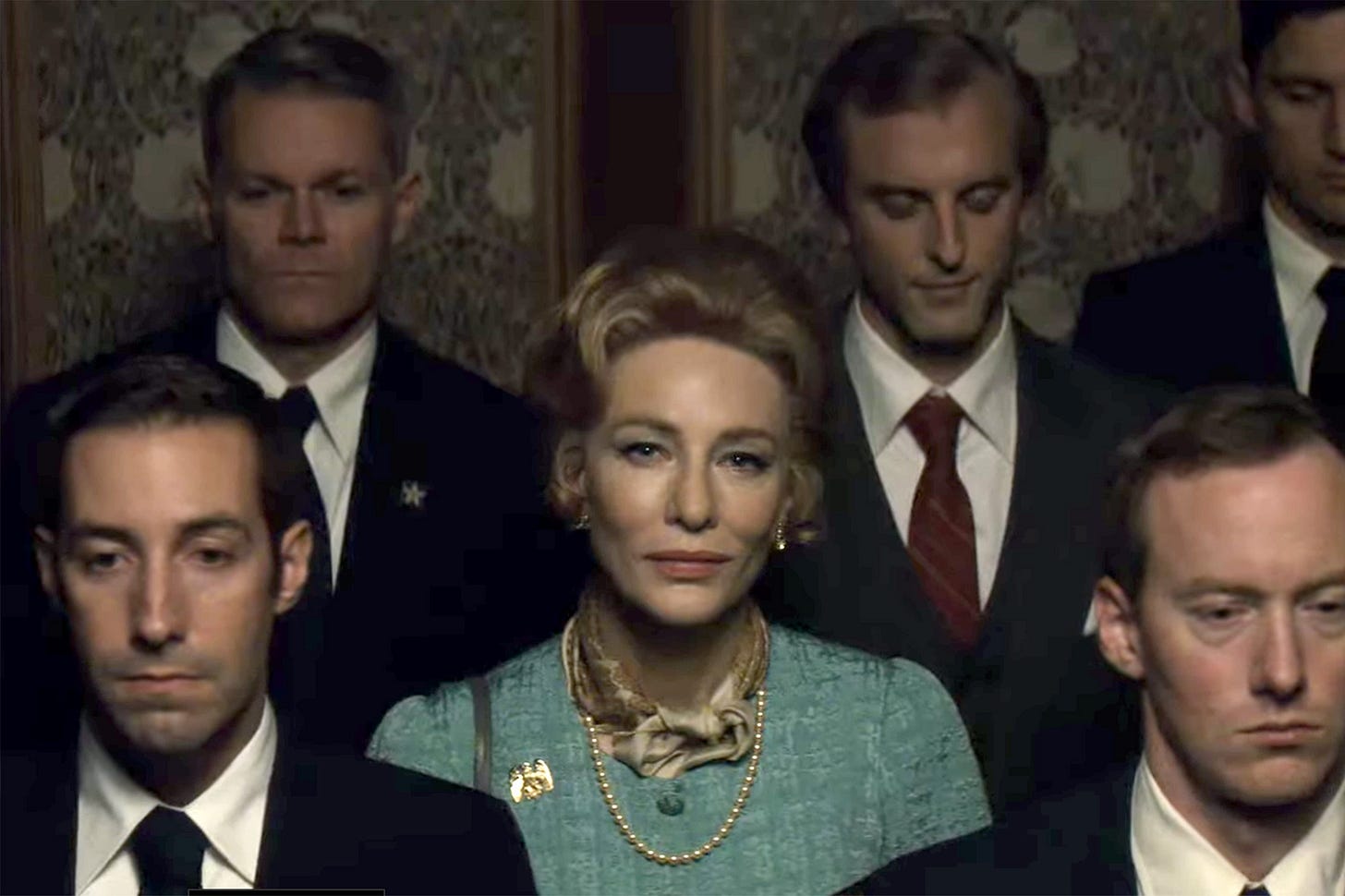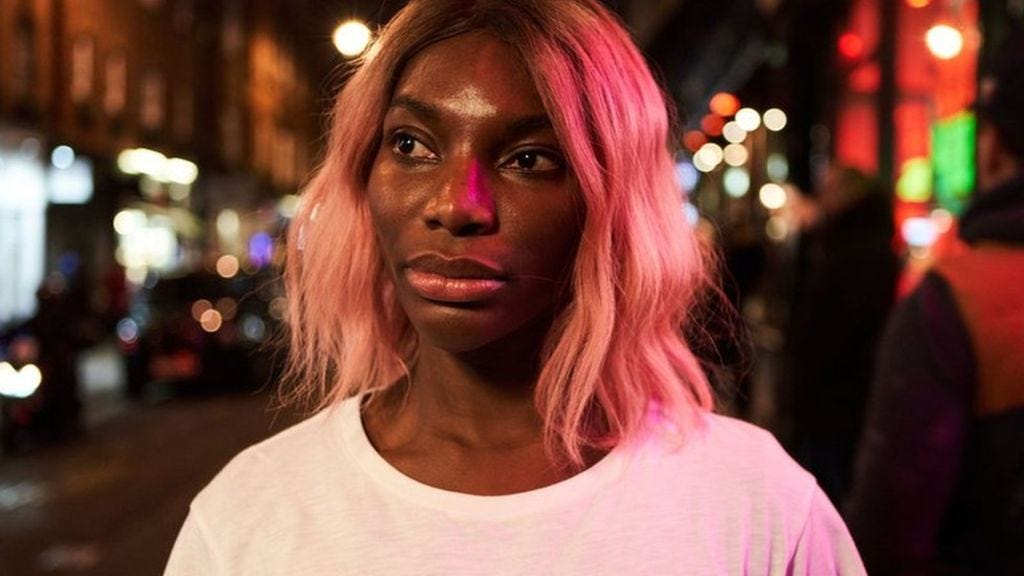Happy Friday!
And it is a happy Friday, because a show I love is now available in Britain. Mrs America, which is showing on BBC Two on Wednesdays and is available on iPlayer, stars Cate Blanchett as Phyllis Schlafly, the anti-feminist activist who was the model for Serena Joy in The Handmaid’s Tale.
Admittedly, had this show been grown in a lab from my very own cells, it could not be more me. It tells the story of the feminist attempt to ratify the Equal Rights Amendment, and the birth of the “moral majority” which led to the modern, culture-warrior Republican party.
Cate Blanchett’s cold smile alone is worth the price of admission, never mind her wardrobe.

If you still need convincing, here’s a phenomenal introduction to the series from my Atlantic colleague Sophie Gilbert, who picks up on the show’s central theme: the creation of the culture war. How did abortion become so central to the US right’s electoral offer? It all goes back to an alliance made by Schlafly.
Also, there are some beautiful bits of cinematography: one of the episode ends with Blanchett, surrounded by men at a party, feeling that she’s being taken seriously at last, only for them to start making crude jokes. Her smile stays fixed, but she backs away from it, like the Cheshire cat. The sound fades, the music rises, the mask stays put.
Helen
Articles That Changed The Way I Think
Richard says: “This is cheating a little bit . . . “all watched over by machines of loving grace” by Adam Curtis. [A scientist’s] extraordinary dedication to finding order in the universe only proved that the world is subject to an all but incomprehensible chaos.” Anna nominates this New Statesman piece on nature writing and eco-fascism, and this article from Quillette explaining gender-critical views.

How JK Rowling Became Voldemort (Atlantic)
Millennials dominate the Harry Potter fandom, a community large enough to have spawned hundreds of thousands of pieces of fan fiction. So it is unsurprising that two major fan sites, The Leaky Cauldron and MuggleNet, have distanced themselves from the books’ author, J. K. Rowling, after she argued last month that “woman” should remain a biological category. The two sites announced last week that they will remove her photograph from their sites, stop linking to her website and writing about her other endeavors, and tag Twitter posts that include news about her with the hashtag #JKR, so users can filter out triggering content from their social-media feeds. To preserve their love of Harry Potter, its fans must erase its author. Rowling, like Voldemort, is so evil that even mentioning her violates a taboo: She Who Must Not Be Named. (Dumbledore would not have approved of this practice. As he tells Harry in The Sorcerer’s Stone, “Always use the proper name for things. Fear of a name increases fear of the thing itself.”)
It’s me, Mario! My favourite response to this piece was the Fan Fiction Big Name who complained I didn’t know enough about Harry Potter to write this. Believe me, I know way too much about Harry Potter. (Please anticipate my TED talk on Das Dobby-tal: House Elves And The Creation Of Capitalism.) My second favourite response was from a priest who offered to explain transubstantiation. Again, sir, I’m all good.

Michaela The Destroyer (Vulture)
Coel recalls one clarifying moment when she spoke with a senior-level development executive at Netflix and asked if she could retain at least 5 percent of her rights. “There was just silence on the phone,” she says. “And she said, ‘It’s not how we do things here. Nobody does that, it’s not a big deal.’ I said, ‘If it’s not a big deal, then I’d really like to have 5 percent of my rights.’ ” Silence. She bargained down to 2 percent, one percent, and finally 0.5 percent. The woman said she’d have to run it up the chain. Then she paused and said, “Michaela? I just want you to know I’m really proud of you. You’re doing the right thing.” And she hung up.
“I remember thinking, I’ve been going down rabbit holes in my head, like people thinking I’m paranoid, I’m acting sketchy, I’m killing off all my agents,” Coel says. “And then she said those words to me, and I finally realized — I’m not crazy. This is crazy.
I May Destroy You sounds great, can’t wait to watch it.
Perfection (Paris Review)
For years I could barely write a page. I thought I was becoming a virtuoso of smallness while the grief, which is wordless, occupied an ever-greater volume.
My friend lived in the estates on the bad side of town. Let’s go to the forest, she said when I went over to play. There were three trees in the yard, but if you know where to stand, you can get lost in a forest of three trees. She could do it. She had to. Her mother died when we were nine.
When I was an “emerging” artist I wanted only to finish emerging. But not knowing what I would become, not knowing the circumference of my life—I never expected to solve those mysteries, and once they were solved, I missed them. I didn’t know I’d miss them.
At the twenty-fifth reunion, a presentiment of the grave, now that all the girls from your high school class have borne the last of their children.
Thank you to Rosemary Waugh for sending me this collage-poem-memoir, which is beautiful.
Quick Links
“I am about to set a timer and write, when I notice someone is wrong on the internet. They have linked to an article without looking at its source.” A study in pandemic procrastination. (Lithub)
“For producers of unscripted shows, Quibi offered a rare chance to make their silliest ideas, like Barkitecture (exotic luxury kennels are made for dogs) and Dishmantled, in which two blindfolded chef-contestants are blasted with a cannonload of mystery-food gloop and must identify the ingredients by taste, then use them to reconstruct the dish.” Is anyone watching Quibi? (Vulture)
The correct answer to this is, of course, “ . . . t h e o r p h a n a g e . . .”
It’s kind of amazing how actors have no resistance to terrible ideas because their whole job is people saying stuff like, “could you cuddle a huge fish in a bath?”
What’s Up With Time’s Up? (Hollywood Reporter)
“When I look at my career and see how affected it was by my speaking out about sexual abuse in the industry, it was massively affected in two ways.” This interview with Thandie Newton is just a series of perfectly aimed blows. Incredible honesty about what it’s like to be a light-skinned black woman in Hollywood.
Dominic Raab did a good thing!
Caitlin Moran on the menopause as a comedown is very funny. (Times paywall version here.)
The New Yorker on Slate Star Codex, in a piece whose sheer length is a touching tribute to SSC.

(Thanks for all the notes for Maureen Colquhoun, btw, I will send them off this week.)

This newsletter is free (and such small portions!) so if you’d like to support its continued existence, do buy my book.


